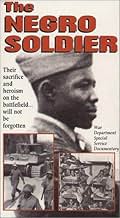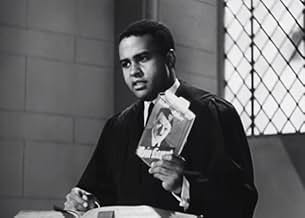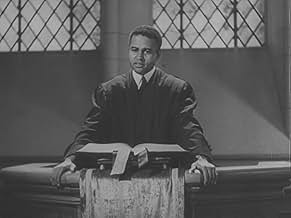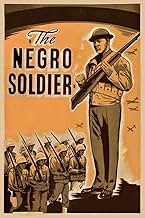Füge eine Handlung in deiner Sprache hinzuDocumentary focusing on the contributions to the American war effort of African-American soldiers.Documentary focusing on the contributions to the American war effort of African-American soldiers.Documentary focusing on the contributions to the American war effort of African-American soldiers.
- Auszeichnungen
- 2 wins total
Max Schmeling
- Self
- (Archivfilmmaterial)
Henry Johnson
- Self - WW1 Soldier
- (Archivfilmmaterial)
George Washington Carver
- Self - Chemist of Agriculture
- (Archivfilmmaterial)
James S. Watson
- Self - Elected Judge in New York City Courts
- (Archivfilmmaterial)
- (as Elected Judge in New York City Courts)
Matthew Henson
- Self - Explorer
- (Archivfilmmaterial)
- (as Explorer)
Vivien Theodore Thomas
- Self - Leading New York City Surgeon
- (Archivfilmmaterial)
- (as Leading New York City Surgeon)
W.C. Handy
- Self - Father of the Blues
- (Archivfilmmaterial)
- (as Father of the Blues)
C.B. Powell
- Self - Financier and Publisher
- (Archivfilmmaterial)
- (as Financier and Publisher)
Gertrude Elise Ayer
- Self - Principal of a New York City Public School
- (Archivfilmmaterial)
- (as Principal of a New York City Public School)
Lawrence Reddick
- Self - Curator, Schomburg Collection of Literature
- (Archivfilmmaterial)
- (as Curator)
Richmond Barthé
- Self - International Prize Winning Sculptor
- (Archivfilmmaterial)
- (as International Prize Winning Sculptor)
Marian Anderson
- Self - Singer
- (Archivfilmmaterial)
- (as Singer)
Jesse Owens
- Self - Sprinter at the 1936 Olympic Games Final
- (Archivfilmmaterial)
- (as Owens)
Erich Borchmeyer
- Self - Sprinter at the 1936 Olympic Games Final
- (Archivfilmmaterial)
- (as Borchmeyer)
Ralph Metcalfe
- Self - Sprinter at the 1936 Olympic Games Final
- (Archivfilmmaterial)
- (as Metcalfe)
Martinus Osendarp
- Self - Sprinter at the 1936 Olympic Games Final
- (Archivfilmmaterial)
- (as Osendarp)
Gustav Weinkötz
- Self - High Jumper at the 1936 Summer Olympics Final
- (Archivfilmmaterial)
- (as Weinkötz)
Empfohlene Bewertungen
This production was made in partnership with the then called Department of War. The goal of this film was to recruit African-Americans to join the war effort in WWII. The film tries to convince blacks that the U.S. has always had an amicable relationship with them. The film offers happy imagery of blacks building log cabins beside the early settlers and working pleasantly beside whites in factories. However, never does the film try to explain or apologize for slavery. The film also suggests that blacks have always had the same opportunities as whites. In this film, slavery, lynchings and inequality are simply erased. For this reason, this film is a true treasure for the propaganda film archive.
The Negro Soldier (1944)
** 1/2 (out of 4)
Mildly entertaining documentary from the War Department, which was made to try and get more black people to join the military. Many of these WWII documentaries were directed by people like Frank Capra and John Huston but this one here comes from Stuant Heslier who got the job at William Wyler quit the project thinking that the documentary was too fake for its own good.
If you recently viewed this film on Turner Classic Movies then you probably saw the introduction with author Mark Harris. If not, his book "Five Came Back: A Story of Hollywood and the Second World War" has some information about this film. From Harris, the War Department feared that black people weren't going to join the Army because there were reports out there that their lives might be better if the United States lost the war. When viewing this film it's obvious the see that the "truth" was being left out and especially since this film tries to make it seem like black people were "free" during 1944.
Of course, we know that a lot of hard times laid ahead but, as Harris states, it's important to remember that this film was made during wartime and the War Department needed people to join. The documentary features Joe Louis as someone doing it "right" and there's a lot of footage from the Olympics that were held in Germany where Jesse Owens shined. The film also talks about Hitler wanting to destroy black people and their freedom. There's a lot of interesting stuff going on here and the film is certainly entertaining but there's just too much missing or covered up for it to be a complete entertainment.
** 1/2 (out of 4)
Mildly entertaining documentary from the War Department, which was made to try and get more black people to join the military. Many of these WWII documentaries were directed by people like Frank Capra and John Huston but this one here comes from Stuant Heslier who got the job at William Wyler quit the project thinking that the documentary was too fake for its own good.
If you recently viewed this film on Turner Classic Movies then you probably saw the introduction with author Mark Harris. If not, his book "Five Came Back: A Story of Hollywood and the Second World War" has some information about this film. From Harris, the War Department feared that black people weren't going to join the Army because there were reports out there that their lives might be better if the United States lost the war. When viewing this film it's obvious the see that the "truth" was being left out and especially since this film tries to make it seem like black people were "free" during 1944.
Of course, we know that a lot of hard times laid ahead but, as Harris states, it's important to remember that this film was made during wartime and the War Department needed people to join. The documentary features Joe Louis as someone doing it "right" and there's a lot of footage from the Olympics that were held in Germany where Jesse Owens shined. The film also talks about Hitler wanting to destroy black people and their freedom. There's a lot of interesting stuff going on here and the film is certainly entertaining but there's just too much missing or covered up for it to be a complete entertainment.
A US World War 2 propaganda film, showing how African-American soldiers are helping the Allied cause.
A well-made propaganda film. Quite stirring in showing the contribution African-Americans had made to previous wars and were making to the current war, World War 2. Made to convince African-Americans to join up and help win the war it does well to paper over the race-based social divide that existed in the US at the time.
Quite sad in the respect in that, while it was okay for African-Americans to fight and die for their country, they were treated as second class citizens at home, with less rights than whites. Just the fact that the film had to be made is a sad reflection of the times.
This said, it is very effective in its purpose and is even quite emotional at times. Some good military footage too.
A well-made propaganda film. Quite stirring in showing the contribution African-Americans had made to previous wars and were making to the current war, World War 2. Made to convince African-Americans to join up and help win the war it does well to paper over the race-based social divide that existed in the US at the time.
Quite sad in the respect in that, while it was okay for African-Americans to fight and die for their country, they were treated as second class citizens at home, with less rights than whites. Just the fact that the film had to be made is a sad reflection of the times.
This said, it is very effective in its purpose and is even quite emotional at times. Some good military footage too.
The aim of the movie is to encourage American blacks to identify themselves with the on-going struggle overseas.
It is convincing but fairly dull in comparison to other Frank Capra propaganda films.
It is convincing but fairly dull in comparison to other Frank Capra propaganda films.
8sbox
This is a good patriotic documentary which focuses on blacks' role in World War II. Made in 1944, this film includes many interesting scenes, from training to actual service.
Wusstest du schon
- WissenswertesIn 2011, the film was selected for preservation in the National Film Registry by the Library of Congress with the following statement: "'The Negro Soldier' showcased the contributions of blacks to American society and their heroism in the nation's wars, portraying them in a dignified, realistic, and far less stereotypical manner than they had been depicted in previous Hollywood films."
- Alternative VersionenAccording to government documents, a two-reel shortened version of the film was released in July 1944.
- VerbindungenEdited from America (1924)
Top-Auswahl
Melde dich zum Bewerten an und greife auf die Watchlist für personalisierte Empfehlungen zu.
Details
Box Office
- Budget
- 78.254 $ (geschätzt)
- Laufzeit
- 43 Min.
- Farbe
- Sound-Mix
- Seitenverhältnis
- 1.37 : 1
Zu dieser Seite beitragen
Bearbeitung vorschlagen oder fehlenden Inhalt hinzufügen





























